When it comes to personalized nutrition, using functional labs has become increasingly important. Functional labs help practitioners take a holistic look into their clients’ bodies. They offer a deeper understanding of an individual's health status, allowing practitioners to identify potential health issues and intervene before a diagnosis is confirmed.
We sat down with Naturopathic Doctor and Functional Health Mentor Michelle Rogers, who helps health and wellness practitioners grow their online practice using expert business strategies and functional lab integration. Her insights on the value of adding functional labs to a practitioner’s toolbox might be just what you need to take your personalized nutrition practice to the next level.

In this article, we will cover:
- The benefits of functional lab testing.
- How to incorporate functional lab testing into your practice.
- Translating functional lab testing into personalized nutrition plans.
- Creating nutrition plans to attract and retain clients.
- Packaging and pricing functional lab nutrition packages.
The Benefits of Functional Lab Testing
Unlike traditional diagnostic tests that focus on diagnosing diseases, functional labs prioritize optimizing health. They provide a comprehensive view of the body, enabling practitioners to make data-driven decisions. Let’s explore the specific benefits of incorporating functional labs into your practice.
1. Improved Client Outcomes
Functional lab testing leads to better outcomes for clients. By validating and explaining the connection between symptoms and lab findings, practitioners can guide their clients with more confidence and develop personalized nutrition protocols. This approach enhances the effectiveness of treatment plans and increases the likelihood of clients reaching their goals.
2. Increased Client Compliance & Engagement
Michelle has found that functional labs serve as a compliance tool, increasing clients’ understanding and motivation to follow through with recommended protocols. The validation and connection provided by functional labs make clients feel seen and heard, ultimately improving their commitment to the healing process.
“Within the healthcare system, a lot of clients feel dismissed for their symptoms, and they don't know why they feel a certain way. Working with functional labs provides validation to clients' questions of ‘what's going on?’. As a practitioner, you can use this fantastic tool to take the guesswork out and ensure personalized and effective health strategies.”
3. Build a Positive Reputation & Attract More Clients
Practitioners who integrate functional labs into their practices increase their authority within the health industry. By using data-driven approaches, practitioners can set themselves apart as experts in their field. Functional labs help monitor client progress and make necessary adjustments, leading to better outcomes and positive testimonials. This establishes a strong reputation and attracts more clients.
How to Incorporate Functional Lab Testing into Your Practice
When it comes to determining which functional lab tests to use and when to use these with clients, Michelle recommends using a comprehensive panel with several tests to gain a holistic perspective. By analyzing multiple functional lab results, practitioners can identify correlations and establish a solid foundation for individualized protocols.
“What I teach inside of my programs is to run all of the labs all at once. In my experience, if you're running just one or a small group of functional labs, it's like trying to see this big picture, but you just have the small view. As a practitioner, it feels extremely limiting, and you can't make a decision confidently if you don't have the full perspective.”
Michelle has found that using functional labs in a strategic way with clients mitigates negative responses and provides quicker results.
Types of Functional Lab Tests
Michelle recommends working with six main functional lab analyses to develop a comprehensive hypothesis of a client's health status:
- Genomics Testing with The DNA Company
- Blood Chemistry Testing
- Hormone and Adrenal Testing with the DUTCH Test
- Organic Acids with the Organix Comprehensive
- Gut Health with the GI MAP
- Food Sensitivities with the MRT
To incorporate functional labs into their practices, practitioners can collaborate with lab companies or distributors like Evexia Diagnostics and Rupa Health. Some distributors offer oversight and support for non-licensed practitioners, enabling them to use functional labs in their practices.
Michelle creates a “welcome kit” containing the functional tests for her clients delivered to their homes. Some testing can be done at home, while blood tests are done at a lab. Michelle can also organize a mobile phlebotomist to visit the client’s home to make it more convenient.
Translating Functional Lab Testing into Personalized Nutrition Plans
Michelle translates her client’s functional lab testing into custom meal plans and recipe books to equip them with a personalized plan. To do this, she uses That Clean Life, the best meal planning app for health and wellness professionals.
“Creating recipe books within That Clean Life is a quick win for clients. They see the beautiful photos, easy recipes with not too many ingredients, and they know they can do this.”
Food Sensitivity Recipe Books
The MRT (Mediator Release Test) allows practitioners to determine if specific foods or food chemicals are causing irritation or inflammation in the body. By eliminating these trigger foods from the client's diet, practitioners can help alleviate symptoms and promote overall well-being. This functional food sensitivity test is the first test result that Michelle typically receives.
To create recipe books based on MRT results, Michelle uses That Clean Life to exclude ingredients marked as “red” and “yellow” foods plus food chemicals from the test results. From here, she can create a recipe book for her client that avoids all red and yellow foods.
“I absolutely love having That Clean Life come in. When I'm making a recipe book, I eliminate foods that come back in yellow or red, and then I have all of these recipes to choose from.”
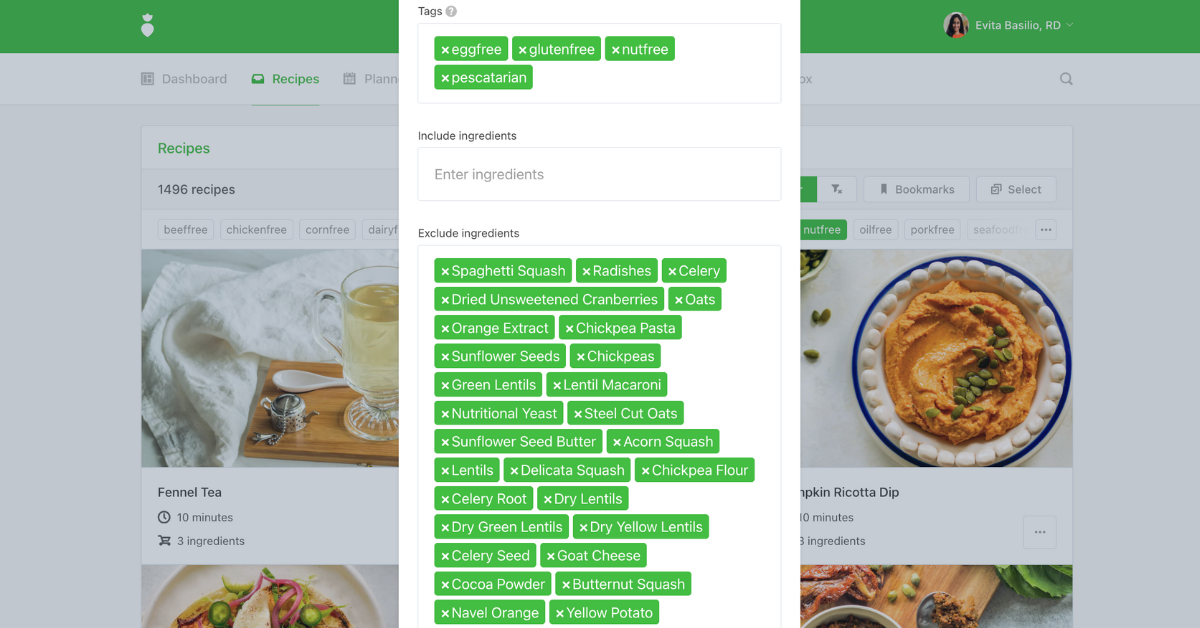
Using That Clean Life with her clients means Michelle can help them take a food-positive approach.
“Instead of saying you can’t eat this, I give them a book of 50 recipes curated to their new way of eating to show all the options they can eat. I found it to be very exciting, inspiring, and motivating for people.”
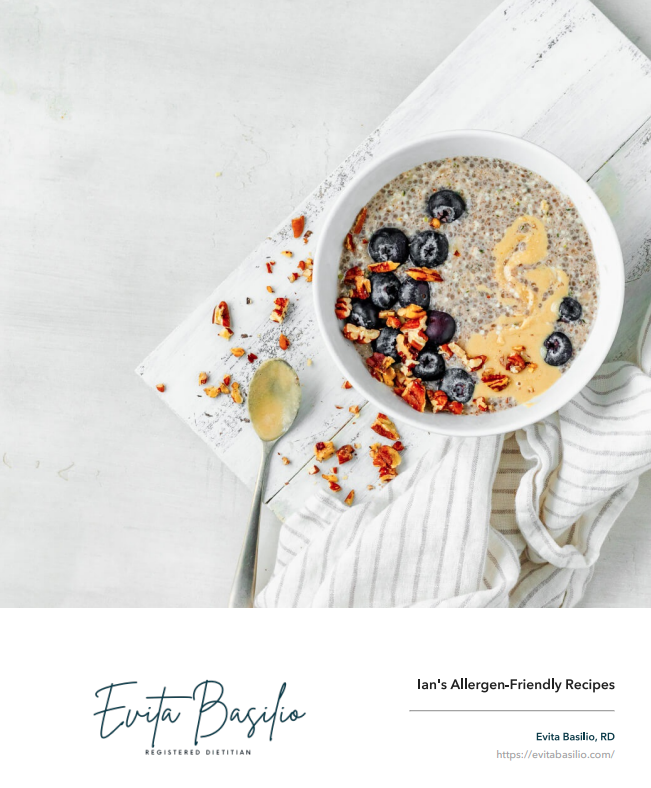
Adding Supportive Foods
As more functional lab results roll in, Michelle will modify the recipe book to focus on certain foods and nutrients.
Functional lab tests play a significant role in assessing gut health and provide insights into hormonal balance and adrenal function. The GI Map test, for instance, enables practitioners to evaluate the gut microbiome, check for intestinal permeability, and identify functional disturbances in gut function. The DUTCH Plus test allows practitioners to understand how the body utilizes hormones and provides insights for optimizing hormonal health.
Michelle uses That Clean Life to find recipes that highlight certain liver and gallbladder-supportive foods for GI Map test results and adrenal-supportive foods for the DUTCH test, like this One Pan Chicken Thighs with Squash & Mushrooms recipe.
“It’s great for the client to have a nutrition plan to implement right away, and then in a couple of weeks, I can add a gut healing protocol or adrenal healing protocol.”

Tip: Save time by using That Clean Life’s pre-made templates like the Liver Support Diet and Plant-Based Liver Support Diet.
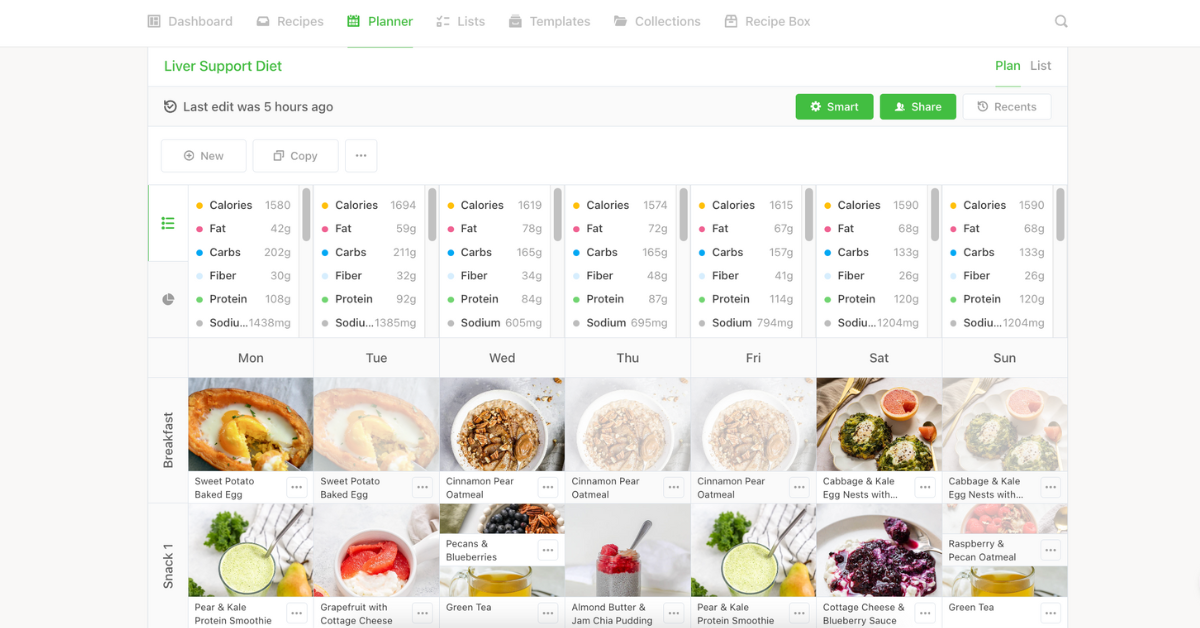
Finding Meals High in Specific Nutrients
Michelle also emphasized the significance of tests like the functional blood chemistry analysis and the organic acids test to focus on adding certain nutrients to a client’s diet. She finds that practitioners can identify imbalances, deficiencies, or excesses that may go unnoticed in standard lab results, enabling them to develop targeted nutrition interventions.
Michelle uses That Clean Life’s nutrition filters to choose meals higher in thyroid-supportive nutrients like selenium, iodine, and zinc if needed, healthy fats, B vitamins, etc.
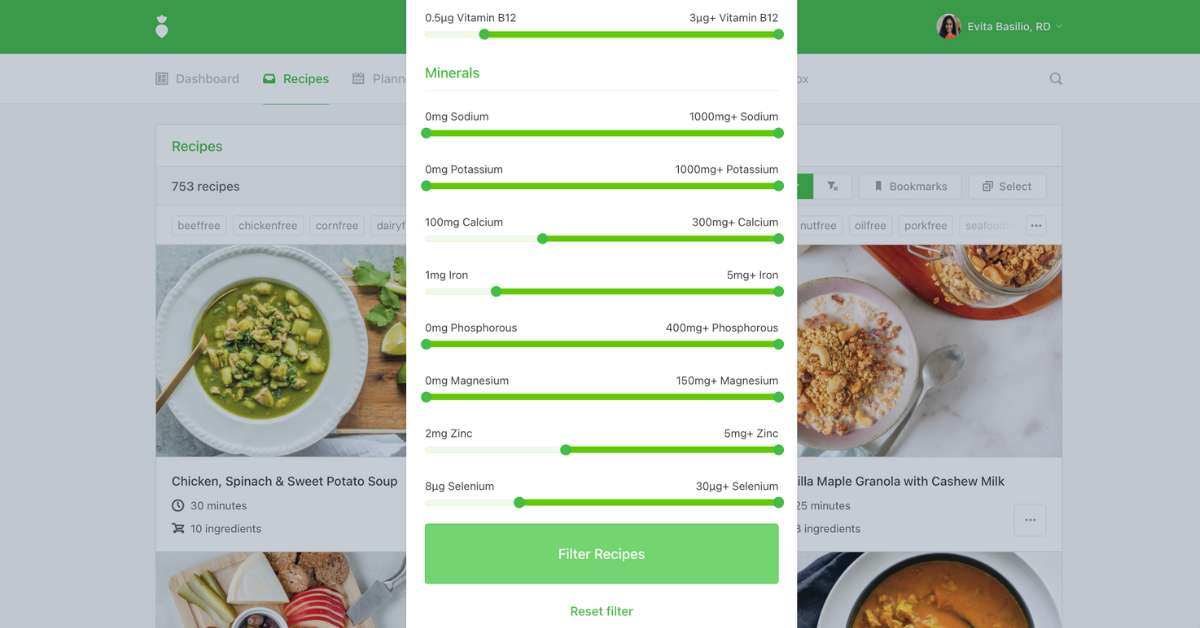
Using That Clean Life as her meal planning app means Michelle can easily put together creative and inspiring recipe books for clients.
“To assist with hormone balance, you could create a follicular phase recipe book and a luteal phase recipe book for different phases of the menstrual cycle.”
Tip: Save time with That Clean Life’s done-for-you templates for women’s health, including the Follicular Phase Support Program, the Luteal Phase Support Program, and the Women's Hormone Balancing Diet.
Nutrition Planning for Restricted Diets
Finally, functional genomics testing allows practitioners to identify potential areas for nutritional fine-tuning and optimization. By understanding genetic predispositions, practitioners can empower clients to make lifestyle and dietary choices that support their unique genetic makeup.
Sensitivities such as lactose or gluten may arise, and Michelle can use That Clean Life to find recipes that are gluten-free and lactose-free to add to her clients’ meal plans or recipe collections.
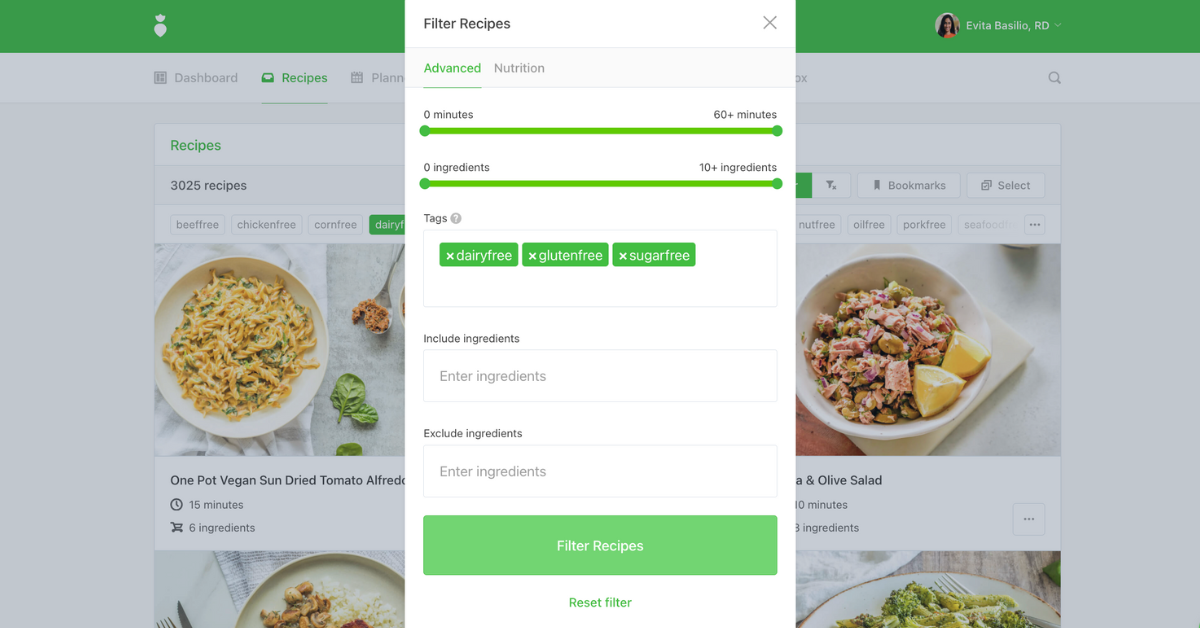
Nutrition Plans to Attract & Retain Clients
Creating a Lead Magnet
For practitioners looking to either start or scale their business, Michelle finds that offering recipe books as an opt-in freebie delivers a quick win. That Clean Life’s done-for-you templates and Airdrops provide fun, creative, and effective nutrition resources and growth ideas.
“For practitioners who know what specific niche they want to work in, they can easily go into That Clean Life and find a resource like a meal plan to use with their community. It gets people’s attention, and they won’t believe you’re giving it away for free.”
Offering a Recipe Membership Club
Once a client completes one-on-one nutrition counseling, they may look for further support from their practitioner. Michelle finds that clients are typically interested in ongoing recipe inspiration. This led her to run a membership program, where she creates a recipe book for members monthly.
“I'll release 15 recipes once a month. It's not too many recipes to overwhelm clients, but it's enough that they have a lot to play with. And then I'll continue to release new recipes on the first of every month.”
Some of her favorite That Clean Life recipes include Vanilla Protein Pancakes, Steak with Pineapple & Avocado Salsa, and Coconut Mango Pudding.

Packaging & Pricing Functional Lab Nutrition Packages
When incorporating functional labs into their practices, practitioners often wonder how to package the services and what to charge. While specific pricing strategies vary depending on factors such as location, length of the package, and target market, it is essential to communicate the long-term benefits of functional labs to potential clients in order to attract the type of client who is committed to their wellness journey.
Michelle recommends practitioners offer package deals that include functional lab testing along with personalized nutrition plans and ongoing support. The package time commitment can vary from a minimum of six months to one year or more in order for clients to see results. The practitioners Michelle has worked with have priced their nutrition packages with functional labs anywhere from $6,000 to $12,000 USD.
Must Read: Pricing Your Meal Planning Services & Programs: Data from 1,000+ Health Professionals
Personalized Nutrition & Healthcare is the Future
Using functional labs to provide personalized nutrition and healthcare brings incredible benefits to both practitioners and clients. By using lab results and insights, practitioners can develop personalized nutrition plans and protocols to guide clients toward better health.
Functional labs provide validation, compliance, and a deeper understanding of the complex interplay between symptoms and underlying imbalances. With data-driven approaches, practitioners can establish themselves as authorities in the field and offer personalized nutrition care that leads to better client outcomes.
Michelle Rogers has dedicated her career to helping health and wellness practitioners implement functional labs into their practices. Michelle offers guidance and support through The WELLth Academy, empowering practitioners to share their unique magic, improve lives, and affect change in the current healthcare paradigm using an integrated approach of business and clinical strategy.

